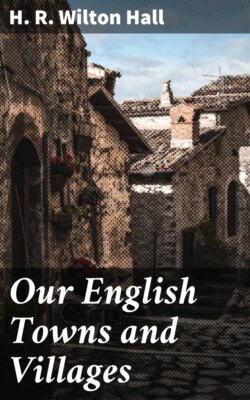Читать книгу Our English Towns and Villages - H. R. Wilton Hall - Страница 9
На сайте Литреса книга снята с продажи.
CHAPTER V
IN ROMAN TIMES
ОглавлениеTable of Contents
1. Here, then, at the time the Romans first came to Britain were tribes of Britons who had been established in the country for centuries, living their lives according to the customs of their forefathers, and more or less cultivating the land. The Romans invaded the country, and, in time, subdued the people. They remained masters here for nearly four hundred years, but they did not make such a permanent impression on this country as they did in some countries which they conquered—as on France and Spain, for instance.
2. We are to-day masters of India; but we have not made India English, nor are we trying to do so. The natives there go on cultivating the land according to their custom from time out of mind. They preserve their own manners, customs, and religions. In places where they come much in contact with our fellow-countrymen, they are influenced to a certain degree; but in India to-day the English and the natives lead their own lives, each race quite apart from the others.
3. So it was with the Romans in Britain. They formed colonies in various places and built towns all over the land; they had country villas dotted here and there, some little distance from the chief towns, and built strong military stations in suitable districts. These posts were kept in communication by means of good roads. Many Britons must in the course of time have adopted Roman ways and Roman civilization; but the bulk of the Britons, living away from the Roman centres, kept to their own customs, and cultivated the ground in the way their ancestors had done. They prospered, on the whole, as the Romans kept the various tribes from fighting with one another.
4. No doubt, in districts such as that which we now call Hampshire, and along the Thames valley, where wealthy Romans had their country villas, Roman methods of farming were in use. The Britons would see something of Roman ways of doing things, and, perhaps, tried to copy them.
5. But the Romans have not left many marks upon our towns and villages. It is quite true that a large number of our present towns and cities are on the sites of, or near, Roman towns; but, in most cases, we have to dig down into the earth to find Roman remains. The most important Roman city, Verulam, has quite disappeared; and the most complete remains of a Roman town, Silchester, are near to what is now a quiet country village. The present cities of London, Winchester, Gloucester, Lincoln, Chester, Carlisle, and the towns of Colchester and Leicester, and several others, can hardly be said to have sprung from Roman towns, though they stand on their sites.
Photo. S. Victor White & Co., Reading
REMAINS OF A ROMAN HOUSE, EXCAVATED AT SILCHESTER (page 24)
6. Most of the Roman cities were built in districts where the Britons had been strong, or where they were likely to give trouble. Carlisle and Gloucester were, for instance, military towns, because they were on the borders of the Roman territory. London and Winchester were trading cities, and they developed much in Roman times.
7. But, when the Roman power was withdrawn, there was, in those cities at any rate, a British population, which had adopted very extensively Roman customs and ideas. For a time things went on much as they had done while the Romans were here; in fact, until the struggles with the Saxons began.
8. As a matter of fact, the coming of the Saxons began a good while before the Romans actually left. Various tribes of Saxons attacked different parts of the coast. Colchester had to keep a sharp look-out for them on the east coast; and the Romans built Portchester Castle, in Hampshire, to guard the south coast.
9. Christianity had found its way to Britain during Roman times, and that helped in the work of civilizing the Britons. But we do not know very much of the early British Church. Christianity probably made more headway among the population in and near the Roman towns than in the wilder districts. The foundations of an early Christian church have been found at Silchester.
Summary.—The Romans held Britain much as we hold India. They did not interfere with the manners and customs, or the religion, of the Britons. The Romans lived in their towns and villas, the Britons in their own settlements. Britons in and near Roman towns gradually adopted Roman ways. Verulam was the chief Roman city, and there were others at London, Winchester, Gloucester, Lincoln, Chester, Carlisle, Colchester, &c. These modern cities, though on the sites of these Roman towns, have not sprung from the Roman cities. The Saxons began to give trouble before the Romans left. Christianity came in Roman times, and the remains of a church have been found at Silchester, in Hants.
